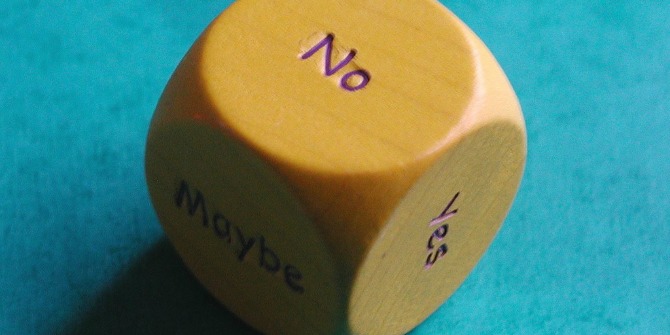The COVID-19 lockdown has rapidly and radically changed academic life, disrupting the normal patterns of teaching and research that define the university. In this post, Adam Oliver reflects on how the lockdown led to him develop the behavioural economics on a post-it series and the particular challenges presented in reducing complex academic ideas to the contours of a single post-it.
In the early days of lockdown, after thinking about how I might continue to fulfil – or even extend – my educational mission (i.e. to attract people to my chosen field of expertise), it struck me that I could perhaps try to combine the old and the new. The old, by using post-it notes to convey some of the key notions in behavioural economics and behavioural public policy; and the new, by using twitter to disseminate the content on the post-its. Through twitter, I thought, I could reach thousands of people; alright, in my case, tens of people, but still more that I could now reach physically, in our socially-distanced world.
Generally, educating yourself (not to mention educating others) to an academically high standard is hard. I think it was the statistician Leonard Savage who once said that in order to educate yourself properly you need to sit up straight in a hard chair. Metaphorically speaking, most of the time you should expect academic education to feel more like an army drill than a stroll in the park (they are, after all, called academic disciplines for a reason). This is one reason why I find it amusing/frustrating/infuriating (depending on my mood) when people classify themselves as a behavioural economist/scientist after reading only one or two of the very great number of popular science books that touch upon the field. I have been studying behavioural economics for nearly thirty years and still often feel like a novice (although no more of a novice than anyone else – Nobel Prize Winners included – should feel themselves to be).
Learning academic content is thus not a form of entertainment, even if it is true that in the field of behavioural science there are people who have forged very healthy careers by trying to make it such
Learning academic content is thus not a form of entertainment, even if it is true that in the field of behavioural science there are people who have forged very healthy careers by trying to make it such. With quirky examples, for instance, some highlight how irrational people are in everyday scenarios, which entertains their audiences who are often uncomfortably aware (or comfortably unaware) that they too are just as susceptible to such quirks. With greater reflection, however, one might realise that the quirks that are highlighted – for instance, the enormous weight placed upon the immediate moment, the greater weight attached to losses than gains – are not really quirks at all; rather, they are (perhaps) affects that evolved over eons to maximise our chances of survival.
That being said, behavioural science is the study of human behaviour and, as such, all of us can relate to it, which is in itself an attraction. And while its teaching cannot equate to entertainment, we know that people will be more attracted to a field of study if it does not look agonisingly dull. That was the cue for my post-it series: an attempt at the avoidance, or alleviation, of the agonisingly dull. Much of behavioural economics, behavioural science and behavioural public policy consists of theories, concepts and empirical examples that can, with care, be explained quite succinctly, and thus for 20 minutes or so each day, from about 9am while drinking a cup of coffee, over a period of 40 days, I set about writing out a behavioural economics notion on a post-it note, taking a picture of it, and posting the picture on twitter.
Much of behavioural economics, behavioural science and behavioural public policy consists of theories, concepts and empirical examples that can, with care, be explained quite succinctly
As implied, my post-it series extended beyond behavioural economics into the relatively new field of behavioural public policy (which focuses on how public policy institutions and interventions can be usefully informed by input from behavioural science). In a very general sense, the series was a chronological depiction of the evolution of this subfield of public policy analysis, and was loosely based upon my book, ‘The Origins of Behavioural Public Policy’ (Cambridge University Press, 2017). As an illustration, one of the post-its, on regret theory, is replicated in Figure 1, which I will not explain further here in order for the reader to discern whether or not I was successful in relaying a complex notion in a post-it format.
Of course, I may never know whether my post-it series gave anyone greater insights into behavioural economics, nor whether it served as a catalyst for droves of people to clamour for more learning (in this area, or others). But it appeared to be appreciated on twitter and it gave me something to do for 20 minutes each morning during lockdown, and that was good enough for me. Perhaps the reason why it worked at all on twitter is because the post-it format ‘stood out’ (a curiosity, much like film photography stands out now against the digital format) – some people might have never seen a post-it note before! Also, post-its can be read quickly – they do not tax too much, and to state the obvious, people are generally not looking for information that is too taxing on twitter (I also experimented with bigger more complex formats – they did not work).
As already noted, behavioural economics, behavioural science and behavioural public policy perhaps fit the post-it format better than other academic fields. To reiterate, education is hard, and it cannot all be succinctly presented. But I would not discourage others from testing out something similar. As to whether it works or not, the proof of the pudding is in the eating, and, if, like I did, you do enough of them, then at the very least, whether they work or not, you will be able to make yourself a piece of wall art, a form of entertainment after all.
Adam tweets @1969ajo where you can find all of the tweets in the behavioural economics on a post-it series.
Note: This article gives the views of the author, and not the position of the LSE Impact Blog, nor of the London School of Economics. Please review our comments policy if you have any concerns on posting a comment below
Image Credit: Adapted from Jazmin Quaynor via Unsplash.










1 Comments